
"Heroes" is the 12th studio album by the English musician David Bowie, released on 14 October 1977 through RCA Records. Recorded in collaboration with musician Brian Eno and producer Tony Visconti, it was the second release of his Berlin Trilogy, following Low, released in January the same year, and the only one wholly recorded in Berlin. Sessions took place in mid-1977 after Bowie completed work on Iggy Pop's second solo album Lust for Life. Much of the same personnel from Low returned for "Heroes", augmented by King Crimson guitarist Robert Fripp.

Lodger is the 13th studio album by the English musician David Bowie, released on 25 May 1979 through RCA Records. Recorded in collaboration with musician Brian Eno and producer Tony Visconti, it was the final release of his Berlin Trilogy, following Low and "Heroes". Sessions took place in Switzerland in September 1978 during a break in the Isolar II world tour, and in New York City in March 1979 at the tour's end. Most of the same personnel from prior releases returned, and future King Crimson guitarist Adrian Belew joined from the tour. The sessions saw the use of techniques inspired by Eno's Oblique Strategies cards, such as having the musicians swap instruments and play old songs backwards.
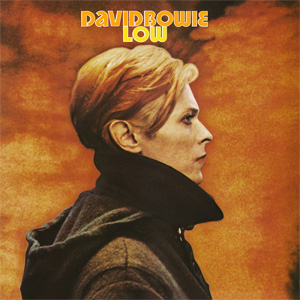
Low is the eleventh studio album by the English musician David Bowie, released on 14 January 1977 through RCA Records. The first of three collaborations with producer Tony Visconti and musician Brian Eno that became known as the Berlin Trilogy, the project originated following Bowie's move to France in 1976 with his friend Iggy Pop to rid themselves of their drug addictions. There, Bowie produced and co-wrote Pop's debut studio album, The Idiot, featuring sounds the former would explore on his next record. After completing The Idiot, sessions for Low began at Hérouville's Château d'Hérouville in September 1976 ended in October at Hansa Studios in West Berlin, where Bowie and Pop had relocated.
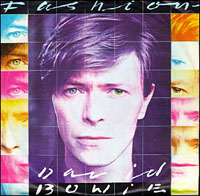
"Fashion" is a song by English musician David Bowie from his 1980 album Scary Monsters . Co-produced by Bowie and Tony Visconti and recorded from February to April 1980 at New York and London, it was the last song completed for the album. Originating as a reggae parody titled "Jamaica", "Fashion" is a post-punk, dance and funk track structurally similar to Bowie's "Golden Years". King Crimson guitarist Robert Fripp contributed lead guitar.
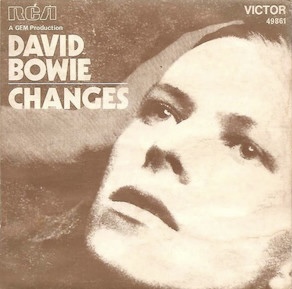
"Changes" is a song by English singer-songwriter David Bowie, originally released on his 1971 album Hunky Dory. RCA Records then released it as a single from the album on 7 January 1972. Written following his promotional tour of America in early 1971, "Changes" was recorded at Trident Studios in London between June and July that year. Co-produced by Bowie and Ken Scott, it featured Strawbs member Rick Wakeman on piano and the musicians who would later become known as the Spiders from Mars: guitarist Mick Ronson, bassist Trevor Bolder and drummer Mick Woodmansey. The song also marks the first instance of Bowie playing the saxophone on one of his recordings.
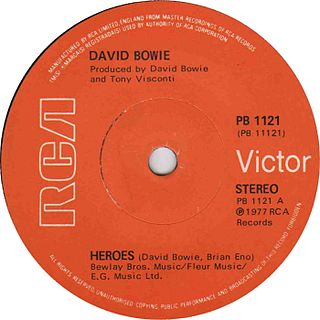
"'Heroes'" is a song by the English musician David Bowie from his 12th studio album of the same name. Co-written by Bowie and Brian Eno and co-produced by Bowie and Tony Visconti, the song was recorded in mid-1977 at Hansa Studio 2 in West Berlin. Using a G–D chord progression, the backing track was recorded fully before lyrics were written; Bowie and Eno added synthesiser overdubs while Robert Fripp contributed guitar. To record the vocal, Visconti devised a "multi-latch" system, wherein three microphones were placed at different distances from Bowie and would open when he sang loud enough. Like other album tracks, he improvised lyrics while standing at the microphone.

"Beauty and the Beast" is a song by David Bowie, the first track on his 1977 album "Heroes". It was issued as the second single from the album in January 1978, becoming a minor UK hit, peaking at No. 39 on the UK Singles Chart.

"Breaking Glass" is a song by the English singer-songwriter David Bowie. It was co-written by Bowie, bassist George Murray and drummer Dennis Davis in September 1976. Originally a track on Bowie's 1977 album Low, a reworked version of the song was a regular on the Isolar II Tour. A live version from that tour was used as the lead track on a 7-inch EP to promote his second live album, Stage in 1978. The EP reached number 54 on the UK Singles Chart in December 1978.
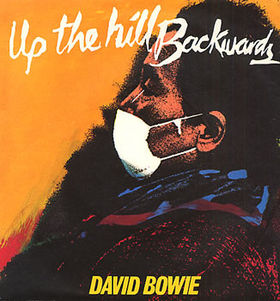
"Up the Hill Backwards" is a song by English musician David Bowie, released on his 1980 album Scary Monsters . It was later issued by RCA Records as the fourth and final single from the album in March 1981. Originally written under the title "Cameras in Brooklyn", the song was recorded between February and April 1980 at the Power Station in New York City and Good Earth Studios in London. The recording features backing vocalists, guitar contributions from Robert Fripp and acoustic guitar played by co-producer Tony Visconti. Lyrically, the song concerns the struggles of facing a crisis, partially influenced by Bowie's divorce from his wife Angie. Musically, the song contains numerous time signature changes and a Bo Diddley-inspired beat.
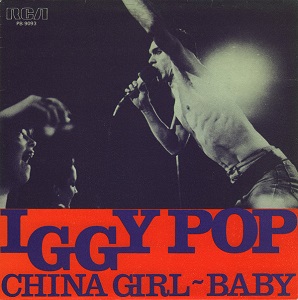
"China Girl" is a song written by Iggy Pop and David Bowie in 1976, and first released by Pop on his debut solo album, The Idiot (1977). Inspired by an affair Pop had with a Vietnamese woman, the lyrics tell a story of unrequited love for the protagonist's Asian girlfriend, realizing by the end that his Western influences are corrupting her. Like the rest of The Idiot, Bowie wrote the music and Pop improvised the lyrics while standing at the microphone. The song was released as a single in May 1977 and failed to chart.

"Loving the Alien" is a song written and recorded by David Bowie. It was the opening track to his sixteenth studio album Tonight. One of two tracks on the album written solely by Bowie, an edited version of the song was released as a single in May 1985, nine months after the release of lead single "Blue Jean" and eight months after the release of the album. "Loving the Alien" peaked at No. 19 in the UK Singles Chart. "Loving the Alien" inspired the title of Christopher Sandford's 1997 biography of Bowie and the 2018 Bowie box set release, Loving the Alien (1983–1988).

"Time Will Crawl" is a song recorded by English singer David Bowie, serving as the second single for his seventeenth album, Never Let Me Down (1987). It was written by Bowie and produced by him and David Richards. Released in 1987 by EMI, the recording addresses the destruction of the planet by pollution and industry; the Chernobyl disaster was a direct influence on the lyrics. The accompanying video served as a teaser to Bowie's Glass Spider Tour (1987). Music critics reviewed "Time Will Crawl" positively, commending its lyrics and production, and describing it one of Bowie's best efforts of the mid– to late–1980s. Additionally, Bowie later called the song one of his favorites from his entire career. Commercially, the single peaked at number 33 on the UK Singles Chart and at number seven on Billboard's Mainstream Rock Tracks chart.

The Berlin Trilogy consists of three studio albums by English musician David Bowie: Low, "Heroes" and Lodger (1979). Bowie recorded the albums in collaboration with English musician Brian Eno and American producer Tony Visconti. The trilogy originated following Bowie's move from Los Angeles to Europe with American singer Iggy Pop to rid themselves of worsening drug addiction. Influences included the German krautrock scene and the recent ambient releases of Eno.
"Big Brother" is a song written by David Bowie in 1973 and intended for his never-produced musical based on George Orwell's Nineteen Eighty-Four. In 1974 it was released on the album Diamond Dogs. It segued into the final track on the record, "Chant of the Ever Circling Skeletal Family".
"Blackout" is a song written and recorded by David Bowie in 1977 for the album "Heroes". Author Nicholas Pegg described the track as "typical of the darkly exhilarating sonic schizophrenia of the "Heroes" album”, while biographer David Buckley remarked on "a backing verging on industrial". Regarding its lyrics and subject matter, Bowie himself said in 1999 that the song "did indeed refer to power cuts. I can't in all honesty say that it was the NY one [New York City blackout of 1977], though it is entirely likely that that image locked itself in my head."
"V-2 Schneider" is a largely instrumental song written by David Bowie in 1977 for the album "Heroes". It was a tribute to Florian Schneider, co-founder of the band Kraftwerk, whom Bowie acknowledged as a significant influence at the time. The title also referenced the V-2 rocket, the first ballistic missile, which had been developed for the German Army during World War II, and whose design played a key role in the American space program.
"Sense of Doubt" is an instrumental piece written by David Bowie in 1977 for the album "Heroes". It was the first of three instrumentals on Side Two of the original vinyl album that segued into one another, preceding "Moss Garden" and "Neuköln".
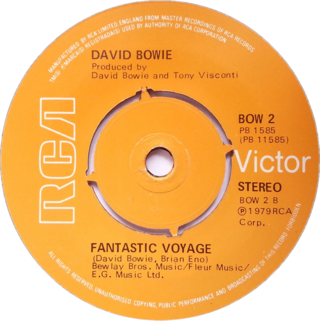
"Fantastic Voyage" is a song written by David Bowie and Brian Eno for the 1979 album Lodger. It has almost exactly the same chord sequence as "Boys Keep Swinging", from the same album. It has also appeared as the B-side to the "Boys Keep Swinging" and "Peace on Earth/Little Drummer Boy" singles, and the US edition of "D.J.".
"Karma Man" is a song written and recorded by English singer-songwriter David Bowie. It was recorded on 1 September 1967 at Advision Studios in London and marked the beginning of Bowie's working relationship with producer Tony Visconti, which would last for the rest of the artist's career. The song expresses Bowie's growing interest in Tibetan Buddhism, concerning a character who is put on display as a "freak" in a carnival tent. The music reflects the Buddhist themes and was likened to the works of the Beatles. Initially proposed as a B-side, it remained unreleased until The World of David Bowie compilation in March 1970. Bowie performed the song during two of his BBC radio sessions, one of which was released on the 2000 compilation Bowie at the Beeb.












